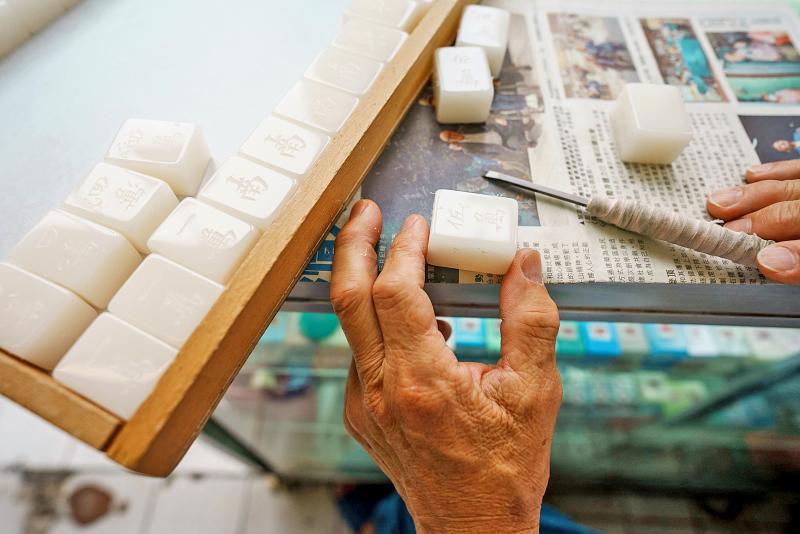Eyebrows furrowed in careful concentration as he chisels images and Chinese characters onto mahjong tiles, 70-year-old Cheung Shun-king is one of the last craftsmen of his kind in Hong Kong.
Hand carving playing tiles for the popular Chinese game used to be a source of income for many, but the introduction of much cheaper machine-made sets whittled away at their customer base and turned their work into a rarity.
Cheung’s family alone used to own four separate shops, where as a teenager he learned his trade.

Photo: AFP
Now only one remains.
“I have given my youth to it,” he says of his work. “I don’t know if I’ll have the energy to carry on in a few years, but for now, I’ll continue to do it.”
Cheung’s store is on a street lined with mahjong parlors, but none of them buy their tiles from him.

Photo: AFP
“My mahjong sets are expensive,” he admits.
A full set of hand-carved tiles costs HK$5,500 (US$700), he says, whereas machine-carved ones are around HK$2,000.
The price reflects the time spent making them. Industrial production of tiles takes about an hour, but it takes five days for Cheung to complete the process of carving and coloring his tiles.
Many of his customers buy sets as souvenirs and often request customized images. But Cheung thinks this recent surge in interest in an old tradition may be ephemeral.
“It is only in these last few years that people have felt a sense of nostalgia” and come to buy his tiles, he says. “What if a few years later no one feels nostalgia?”
Despite his belief that his industry will continue to decline, Cheung says he will work for as long as he can, until there is no demand.
He used to conduct workshops for young people but does not want to take on apprentices because of his pessimism.
“To learn [this skill] isn’t a matter of one or two months — attempting it wouldn’t work if you didn’t immerse yourself in it for two to three years,” Cheung says.
“If, by then, handcrafted mahjong tiles are no more a trend, then this skill would become useless.”
Cheung does not know how to play mahjong himself — his interest lies only in crafting the tiles.
He says that being called an artist, however, is flattering, and a “big compliment” for him.
“If others say it is art, then it is art. For me, it is my job, as I have to make a living.”

Growing up in a rural, religious community in western Canada, Kyle McCarthy loved hockey, but once he came out at 19, he quit, convinced being openly gay and an active player was untenable. So the 32-year-old says he is “very surprised” by the runaway success of Heated Rivalry, a Canadian-made series about the romance between two closeted gay players in a sport that has historically made gay men feel unwelcome. Ben Baby, the 43-year-old commissioner of the Toronto Gay Hockey Association (TGHA), calls the success of the show — which has catapulted its young lead actors to stardom -- “shocking,” and says

Inside an ordinary-looking townhouse on a narrow road in central Kaohsiung, Tsai A-li (蔡阿李) raised her three children alone for 15 years. As far as the children knew, their father was away working in the US. They were kept in the dark for as long as possible by their mother, for the truth was perhaps too sad and unjust for their young minds to bear. The family home of White Terror victim Ko Chi-hua (柯旗化) is now open to the public. Admission is free and it is just a short walk from the Kaohsiung train station. Walk two blocks south along Jhongshan

The 2018 nine-in-one local elections were a wild ride that no one saw coming. Entering that year, the Chinese Nationalist Party (KMT) was demoralized and in disarray — and fearing an existential crisis. By the end of the year, the party was riding high and swept most of the country in a landslide, including toppling the Democratic Progressive Party (DPP) in their Kaohsiung stronghold. Could something like that happen again on the DPP side in this year’s nine-in-one elections? The short answer is not exactly; the conditions were very specific. However, it does illustrate how swiftly every assumption early in an

Snoop Dogg arrived at Intuit Dome hours before tipoff, long before most fans filled the arena and even before some players. Dressed in a gray suit and black turtleneck, a diamond-encrusted Peacock pendant resting on his chest and purple Chuck Taylor sneakers with gold laces nodding to his lifelong Los Angeles Lakers allegiance, Snoop didn’t rush. He didn’t posture. He waited for his moment to shine as an NBA analyst alongside Reggie Miller and Terry Gannon for Peacock’s recent Golden State Warriors at Los Angeles Clippers broadcast during the second half. With an AP reporter trailing him through the arena for an